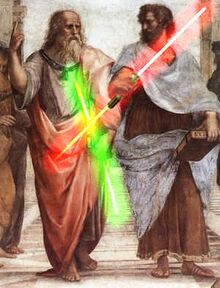Idealism
| Part of a series on |
| Philosophy |
|---|
 |
| Philosophers |
|
Ancient and Greek
|
|
19th-century
|
|
Americans
|
| Philosophies |
| Related |
|
|
Idealism is a branch of philosophy dealing with the relationship between the conscious perceptions of the human mind and physical objects in the surrounding environment. Basically idealists assert either one of three things and therefore belong to one of three schools of thought:
- Those who believe that chairs don’t exist.
- Those who believe that tables don’t exist.
- Those who believe that trees don't exist.
If you’ve ever been lectured by an idealist then you’ll know all they ever talk about is the non-existence of either chairs, tables or trees outside the window. The no-chair-idealists benefit from having a desk on which they can write their philosophical theories whereas the no-table-idealists enjoy sitting time during which they can continuously ponder why exactly they have no hard surfaces to write on. The no-tree-idealists have the comforts of desks and chairs, but no trees to sit under and be hit on the head with apples. No-tree-idealists do in fact believe in windows, otherwise they could not look out of the window to describe the tree which does not exist.
When someone subscribes to the beliefs of idealism they are made to choose from one of the three movements (no-chair, no-table, no-tree). Those who mistakenly try and adopt more that one of these doctrines are referred to as dualists (that is: one who believes in the non-existence of tables, chairs and trees), which is a rival branch of philosophy. Those who follow the non-treeistic doctrine, plus one of the other two, find this a considerable impediment when asked to write about the non-existence of trees.
Criticisms[edit]
Swedish furniture-venders IKEA maintain that their chairs and tables do in fact exist and that any change in the common belief that their chairs and tables do exist (and for such low prices) would be contradictory to their advertisement campaigns, which regrettably rely predominantly on the existence of their chairs and tables in order to sell the aforementioned chairs and tables.
Isaac Newton on Notreeism[edit]
Isaac Newton is considered the first person to have come up with a theory for the impossibility of notreeism, his theory runs as follows -
- The theory of the wisdom of the crowd is correct.
- Most believe that I was hit on the head with an apple falling from a tree.
- Therefore, trees must exist for apples to fall off them.
You will notice that theory is fundamentally flawed as it contains no reference to the dropping of pens. Others have realised that to write down this theory, Newton must have been sitting on a chair, and using a table, most sensible people will realise that one of these two items is not necessary for the construction of a theory.
Factional movements[edit]
Popular films such as The Matrix occasionally claim that tables and chairs do in fact exist but that it is only spoons which are subject to non-existence.